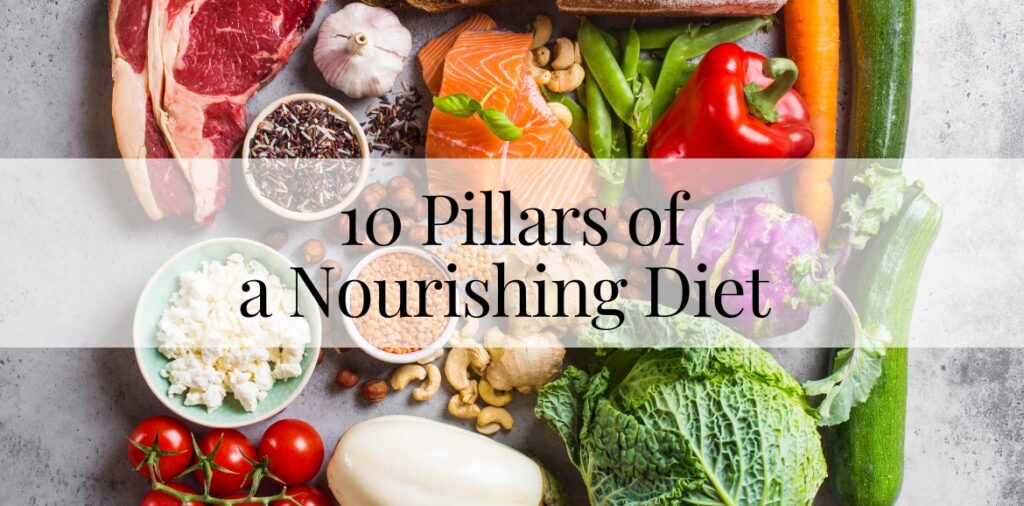
There are so many diets that are promoted in our culture. Certainly, there is not one specific diet that meets every person’s needs. However, there are certain pillars that are necessary for nourishment and health, no matter what type of diet you may choose to follow, whether Paleo, Keto, Vegetarian, Mediterranean, etc. According to Webster’s Dictionary, nourishment is the act of promoting growth; to build up and to strengthen the body. Below are 10 pillars of any diet that are necessary for health and vitality.
Eat Whole Foods
Whole foods are defined as any food that is made up of a single ingredient. Examples include: meat, poultry, fish, eggs, fruits, vegetables, and grains. Whole foods are the healthiest because they do not contain additives or preservatives. In addition, they are nutrient dense, rich in vitamins, minerals, antioxidants, and amino acids.
Avoid Processed Foods
Processed foods can easily be spotted because they typically come in boxes, bags, or other packaging. But, to be certain, we often define processed foods as any food that contains more than 5 ingredients or has any ingredients that are difficult to pronounce or are unrecognizable as food. Processed foods commonly contain ingredients that are chemically derived and harmful to our health. In addition, these foods often contain unhealthy fats and simple carbs that are also detrimental to your health.
Eat Adequate Amounts of Protein
Most people do not ingest enough protein. Studies show that people who eat at least 40% of their diet as protein tend to have less cravings, they do a better job meeting their nutrient intake needs and they also tend to naturally maintain a healthy body weight. A good rule of thumb is to ingest 1g of protein per pound of body weight.
Eat a Rainbow of Fruits and Vegetables
By eating a variety of fruits and vegetables we can be confident that we are taking in the full spectrum micronutrients (vitamins, minerals, phytonutrients and antioxidants) that are vital to all of our body processes. These micronutrients are key in bolstering our immune system as well. Fruits and vegetables are also rich in fiber, which is vital for digestion.
Eat Healthy Fats
Healthy fats include fatty fish, butter, ghee, extra virgin olive oil, extra virgin coconut oil, avocado oil, coconut, avocados, nuts and seeds. We all need to avoid unhealthy fats, which include vegetable and seed oils, such as canola, sunflower, corn oil, hydrogenated fats like Crisco, and many others. These fats are high in Omega 6 fats, which are harmful to our cardiovascular system and are also very inflammatory to the body.
Eat Probiotic Rich Foods
Probiotic rich foods contain healthy bacteria that support the good bacteria in our gut. These gut bacteria are important for digestion, fighting off bad bugs, boosting the immune system, and also for synthesizing certain vitamins. Probiotics can be found in yogurt, kefir, sauerkraut, kimchi, pickles and kombucha.
Eat Prebiotic Rich Foods
Prebiotic rich foods help to feed the good bacteria in our gut. These foods include apples, garlic, asparagus, leeks, bananas, Jerusalem artichokes, onions, chicory root, dandelion greens, oats and many others. In addition to supporting your digestion, prebiotics also support a healthy weight, help to strengthen the immune system and help to lower cholesterol and inflammation.
Drink Adequate Amounts of Water Daily
Water intake is crucial. It helps aid digestion, it lubricates your joints, it helps to decrease cravings and hunger, and it is vital for your bodily processes to function optimally. A good rule of thumb is to aim for half your body weight in ounces of water per day, drinking even more when you exercise or sweat.
Purchase High Quality Ingredients
When possible, purchase free range chicken/eggs, grass fed meat, wild fish, and organic fruits and vegetables. These foods often contain higher nutrient values and they lack the herbicides and pesticides found in conventional/industrial farmed foods. You can refer to the Environmental Working Group’s Clean 15 (https://www.ewg.org/foodnews/clean-fifteen.php) and Dirty 12 (https://www.ewg.org/foodnews/dirty-dozen.php) to see which fruits and vegetables are most important to purchase organic and which are not necessary. Do not let this area stress you out. Just do what you can afford. Buying whole ingredients is most important, even if you cannot buy organic, etc.
Prepare Foods at Home as Much as Possible
When you prepare foods at home you know what ingredients are going into your meals. Foods purchased at restaurants often contain low quality ingredients such as bad fats, simple carbs/sugars, additives and artificial ingredients, preservatives, pesticides, herbicides and conventionally farmed items in order to keep the food preparation costs low. The only way to be sure you are ingesting healthy food is to prepare it yourself whenever possible.
Healthy food and pleasure from eating should go together. With knowledge about what ingredients to choose you are fully equipped to make healthy nourishing meals. You might want to search the internet/pinterest for healthy recipes, or even purchase a new cookbook. The key is to find some new and fun recipes to try. Share recipes with friends, invite friends and family over for dinner, enjoy meals with your family…mealtimes are special and deserve extra care and attention.






